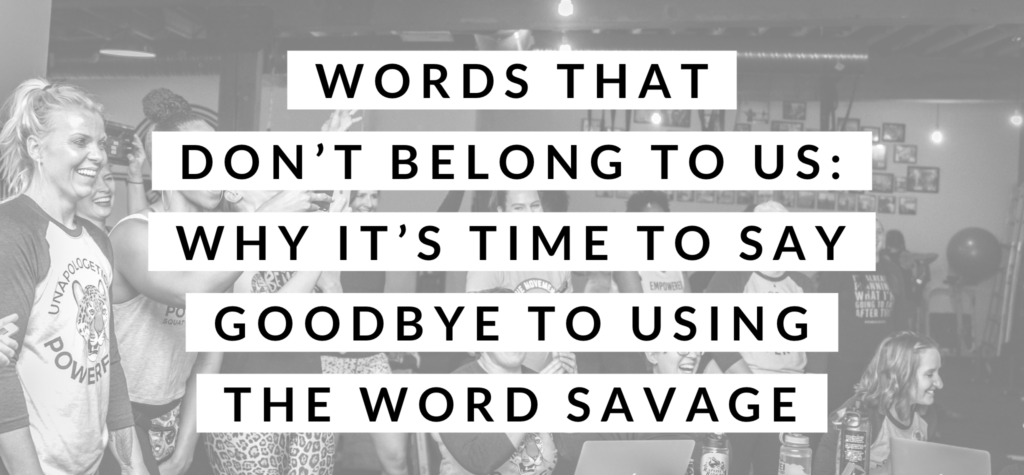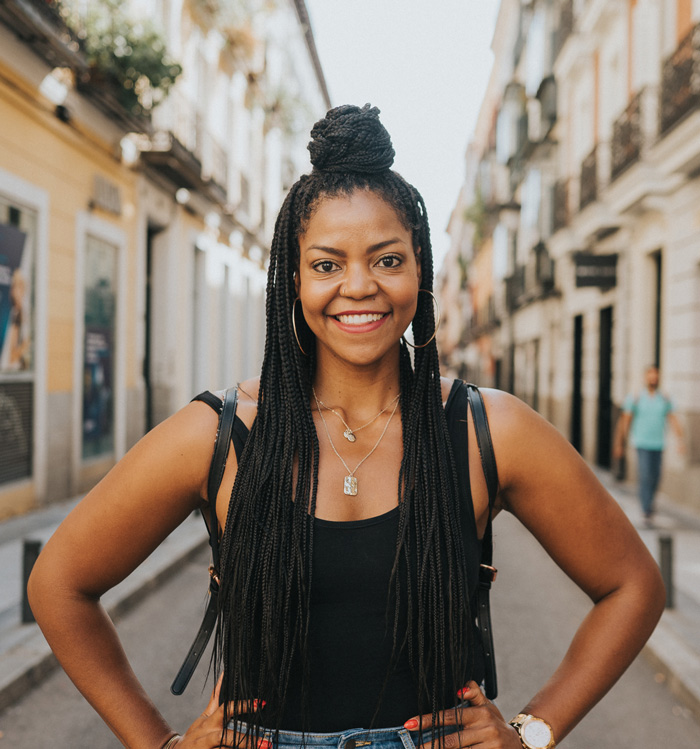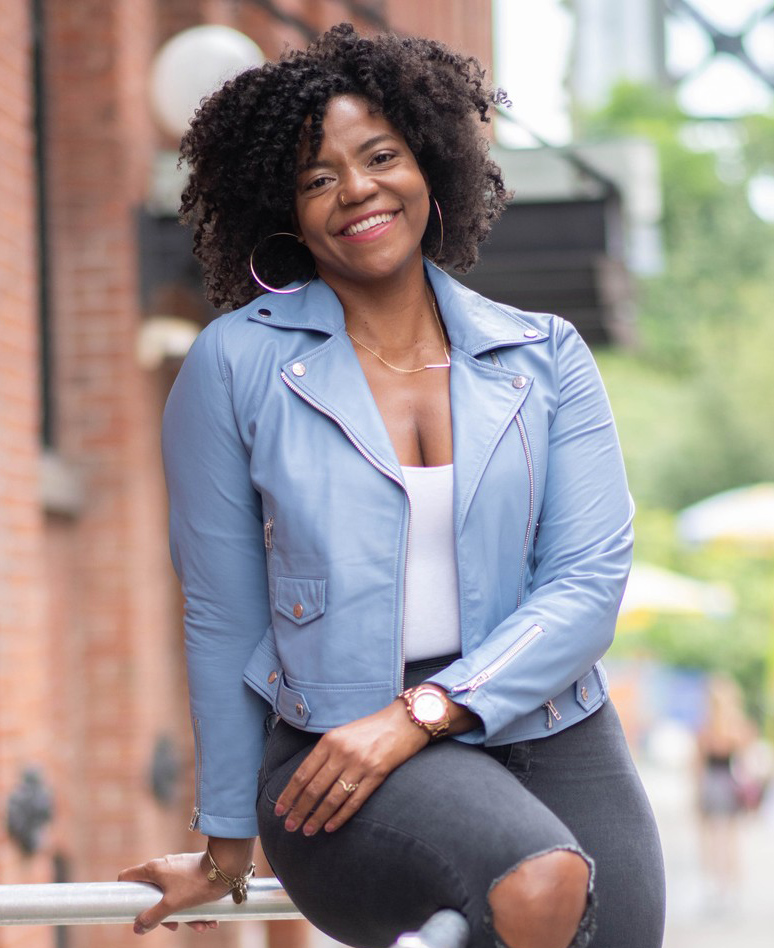On Indigenous People’s Day (formerly known as Columbus Day), I posted a picture to my Instagram story of a t-shirt with the word ‘Savage’ written across it. The shirt was available for purchase at Target. My exact words on the post were, “Dear Target and everyone else who thinks it’s okay to use this word to profit at the expense of marginalized groups, please stop and decide to be a better human. This is not okay.”
Unfortunately, Target is not the only culprit. There are a number of fitness companies and influencers using this racial slur for financial profit with blatant disregard to the harmful nature of the word.
I woke up the next morning, and my DMs were flooded. Half of the messages were from people who were in agreement with me and completely understood why using this word is offensive. The other half were from people either asking why it was a problem, or explaining they had never even stopped to consider it and thanking me for bringing it to their attention.
Unfortunately, I also received a few comments from white women who were indignant at the suggestion that we shouldn’t use the word ‘savage’. Additionally, I even had some members of the fitness community argue with me about why it is okay for them to use the word and even further, use it for profit.
Here’s one of the comments I received:
“I’m not in the business of blacklisting a word simply because some have chosen to use it inappropriately.”
The words ‘faggot’ and ‘nigger’ (or ‘nigga’) immediately come to mind as words that are not acceptable for use by people outside of the community. It doesn’t matter what you’re ‘in the business of blacklisting’ or not blacklisting. It’s not your choice. Members of marginalized communities can reclaim words that have been used to dehumanize them in whatever ways feel good for them. For example, black people have reclaimed the n-word and completely changed the context. Although there is mixed feelings and some debate about the use of the n-word within the black community, one thing is not up for debate, it’s not for non-black people – regardless of context.
While you can use whatever words you want, you also have to face the consequences and the backlash as a result of your choices.
Secondly, the other prominent argument is that the word ‘savage’ by definition, means ‘fierce, violent, and uncontrolled’ or more popularly, ‘badass.’ While some people have to tried to change the context and meaning of the word, the fact remains the word ‘savage’ has its origin in colonialism and oppression, most notably as a term used against indigenous people.
The word ‘savage’ didn’t start out meaning ‘bad ass’. Colonizers weren’t calling indigenous people ‘savages’ as a term of endearment to describe how ‘badass’ they were. In fact, in the Declaration of Independence, indigenous people are referred to as, “merciless Indian savages.” The word was used to dehumanize indigenous people and justify genocide. Continuing to use this word is disrespectful and disregards the systematic oppression and racism that indigenous people still face today.
Has the cultural context of the word changed over time? Well, that depends on who you ask. While a majority of non-indigenous Americans might argue that it has, it’s still considered offensive by indigenous people, and it’s still a reminder of a painful history of racism and genocide. Similarly, the cultural context of the n-word has also changed in a lot of ways. However, if you aren’t black, you don’t have a pass to say it, even when it’s the lyrics in your favorite Drake song.
Words don’t belong to everyone.
Ta-Nehisi explains this concept in such a beautiful way. Check it out below:
While the video primarily discusses the use of the word n-word, the same principle applies to all words that are related to a particular group or community.
Using the word ‘savage’ is dehumanizing and erases the painful history of indigenous people.
What I realized from the overwhelming amount of responses I received, is many people have never taken the time to realize how much some words matter. They matter a lot. When people disregard the historical and complicated origins of words in favor of using a word as slang, we disregard the feelings of people who suffered hundreds of years of oppression and continue to be oppressed today.
When we are faced with a situation in which we are ‘called in’, there are a few actions steps I think are really important and encourage everyone (myself included) to do:
- Resist the urge to get defensive.
When someone attempts to call you in and explain why something you opted to do is inherently racist or problematic in nature, the natural response may be to get defensive and defend your actions. I urge you to you to resist the urge to defend your position and instead, simply listen. When members of marginalized communities are sharing their experiences with you or perhaps explaining why a particular action is offensive or has unintended consequences, take their word for it.
When you think your intentions were pure, it can feel really tempting to become defensive about your position and even feel indignant that someone would call you out. Resist those feelings and accept the critique with open arms, realizing that it’s an opportunity for improvement and growth.
2) Recognize your privilege in the scenario.
The concept of white privilege still incites fury in some people because some individuals interpret the term to mean people are insinuating that everything has been given to them or that perhaps they didn’t work hard for what they have. However, it actually doesn’t mean that at all. While we have all been socially conditioned to believe the “pull yourself up by the bootstraps” ideology, there are systematic and structural factors in place that allow some people, particularly white people, to do this with much more ease and fewer barriers.
In its simplest form, the concept of white privilege means that your experience as a white person comes with certain benefits and privileges that people of color do not experience. It also means that your experience as a white person in the world is vastly different than that of a person of color.
Choosing to profit from words that were created to dehumanize marginalized groups is an example of privilege in action.
It’s important to note that most people experience some form of privilege as there’s also privilege associated with things like gender, appearance, body size, and class, to name a few. However, some people experience a lot more privilege than others. Keep that in mind as you consider the ways in which you are allowed to operate in the world.
3. Think critically
If you disagree with me or are outraged that I would suggest that you choose to abstain from using certain words, especially for personal profit, why does that bother you? Why do you think you should have access to everything? What role does privilege play in your feelings?
If a member of a marginalized group informs you that a word is offense, why is there a need to debate that? Why is difficult to respect the person’s feeling and discontinue using the word?
Be honest with yourself as you answer these questions. Sit with any feelings of discomfort. Question your indignation.
4. Do research
I encourage everyone to do their own research. By research, I do not mean ask your friends. I mean use actual reputable resources to understand the origin and history of words. Group think is a powerful reality and relying on feedback from friends and those around you isn’t the best way to evaluate your opinions.
Secondly, I really encourage everyone to learn the actual history of this country. The more I have conversations with people, the more I realize how few people actually know and understand the difficult and complicated origins of America. So many people have very little knowledge of U.S. colonial history. If you have no idea where to start, I recommend reading, “A People’s History of the United States.”
Here are some great places you can start your research on the word ‘savage’:
https://www.sasanehsaeh-pyawasay.com/blog/2018/1/12/savage
https://theestablishment.co/stop-calling-people-savage-7746984d565d/tjAY
5. Take responsibility.
Here’s the thing. We all mess up sometimes. I’m guilty. You’re guilty. We are all guilty of getting it wrong sometimes or of being misinformed. As long as we continue to live, we will make mistakes. The best thing we can do when we mess up is to own up to it. Hiding from it or refusing to acknowledge you missed the mark is the worst way to handle the situation. Take responsibility, fix it to the best of our ability, and decide to be better in the future.
While I can’t make anyone stop using the word ‘savage’ or the n-word, I can educate people on why we need to do better collectively. Ultimately, everyone makes their own decisions on how they choose to operate and utilize their privilege. The fact remains that words do have meaning, and the whitewashing of the true meaning and origins of words doesn’t give us free reign to use racial slurs, particularly for profit.
Ultimately, we people don’t have the right to decide if a word is offensive to a member of a marginalized group.
Some words are not ours to access, and most certainly not ours to profit from.
You don’t get to decide you are entitled to profit from the painful experiences of marginalized people, just like it’s not okay to appropriate culture for profit. It’s the responsibility of the privileged to challenge the status quo instead of choosing to maintain and uphold the status quo.
It’s time to say goodbye to using the word ‘savage’. In fact, we should have never been using it. But hopefully, now that you know better, you decide to do better.
I fully understand all of these conversations are nuanced and can feel difficult to navigate. If you are interested in learning more about how to engage in meaningful dialogue, how to be an effective ally, and how to overcome the fear of making mistakes, the Foundations of Social Justice Course is perfect for you.
My friend, Dr. Tee, is teaching the course, and he has over 20 years of experience in diversity and inclusion work, plus a PhD in Social Justice Education. I have the pleasure of chatting on the phone with him occasionally, and every single time, I leave the conversation with new insights and feeling better equipped to continue doing my work in the world.
If you desire to learn more in a safe and educational environment, I highly recommend his course. You can check out all the details or get signed up HERE.
P.S.- If you want to receive exclusive emails about body image, nutrition, mindset, and fitness (through an intersectional lens), please join me here –>https://chrissyking.com/newsletter/









